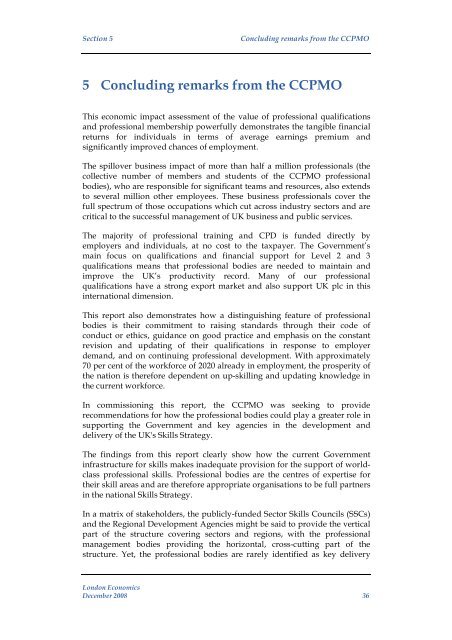Economic impact assessment of the CCPMO: Final report - CIPD
Economic impact assessment of the CCPMO: Final report - CIPD
Economic impact assessment of the CCPMO: Final report - CIPD
You also want an ePaper? Increase the reach of your titles
YUMPU automatically turns print PDFs into web optimized ePapers that Google loves.
Section 5<br />
Concluding remarks from <strong>the</strong> <strong>CCPMO</strong><br />
5 Concluding remarks from <strong>the</strong> <strong>CCPMO</strong><br />
This economic <strong>impact</strong> <strong>assessment</strong> <strong>of</strong> <strong>the</strong> value <strong>of</strong> pr<strong>of</strong>essional qualifications<br />
and pr<strong>of</strong>essional membership powerfully demonstrates <strong>the</strong> tangible financial<br />
returns for individuals in terms <strong>of</strong> average earnings premium and<br />
significantly improved chances <strong>of</strong> employment.<br />
The spillover business <strong>impact</strong> <strong>of</strong> more than half a million pr<strong>of</strong>essionals (<strong>the</strong><br />
collective number <strong>of</strong> members and students <strong>of</strong> <strong>the</strong> <strong>CCPMO</strong> pr<strong>of</strong>essional<br />
bodies), who are responsible for significant teams and resources, also extends<br />
to several million o<strong>the</strong>r employees. These business pr<strong>of</strong>essionals cover <strong>the</strong><br />
full spectrum <strong>of</strong> those occupations which cut across industry sectors and are<br />
critical to <strong>the</strong> successful management <strong>of</strong> UK business and public services.<br />
The majority <strong>of</strong> pr<strong>of</strong>essional training and CPD is funded directly by<br />
employers and individuals, at no cost to <strong>the</strong> taxpayer. The Government’s<br />
main focus on qualifications and financial support for Level 2 and 3<br />
qualifications means that pr<strong>of</strong>essional bodies are needed to maintain and<br />
improve <strong>the</strong> UK’s productivity record. Many <strong>of</strong> our pr<strong>of</strong>essional<br />
qualifications have a strong export market and also support UK plc in this<br />
international dimension.<br />
This <strong>report</strong> also demonstrates how a distinguishing feature <strong>of</strong> pr<strong>of</strong>essional<br />
bodies is <strong>the</strong>ir commitment to raising standards through <strong>the</strong>ir code <strong>of</strong><br />
conduct or ethics, guidance on good practice and emphasis on <strong>the</strong> constant<br />
revision and updating <strong>of</strong> <strong>the</strong>ir qualifications in response to employer<br />
demand, and on continuing pr<strong>of</strong>essional development. With approximately<br />
70 per cent <strong>of</strong> <strong>the</strong> workforce <strong>of</strong> 2020 already in employment, <strong>the</strong> prosperity <strong>of</strong><br />
<strong>the</strong> nation is <strong>the</strong>refore dependent on up-skilling and updating knowledge in<br />
<strong>the</strong> current workforce.<br />
In commissioning this <strong>report</strong>, <strong>the</strong> <strong>CCPMO</strong> was seeking to provide<br />
recommendations for how <strong>the</strong> pr<strong>of</strong>essional bodies could play a greater role in<br />
supporting <strong>the</strong> Government and key agencies in <strong>the</strong> development and<br />
delivery <strong>of</strong> <strong>the</strong> UK's Skills Strategy.<br />
The findings from this <strong>report</strong> clearly show how <strong>the</strong> current Government<br />
infrastructure for skills makes inadequate provision for <strong>the</strong> support <strong>of</strong> worldclass<br />
pr<strong>of</strong>essional skills. Pr<strong>of</strong>essional bodies are <strong>the</strong> centres <strong>of</strong> expertise for<br />
<strong>the</strong>ir skill areas and are <strong>the</strong>refore appropriate organisations to be full partners<br />
in <strong>the</strong> national Skills Strategy.<br />
In a matrix <strong>of</strong> stakeholders, <strong>the</strong> publicly-funded Sector Skills Councils (SSCs)<br />
and <strong>the</strong> Regional Development Agencies might be said to provide <strong>the</strong> vertical<br />
part <strong>of</strong> <strong>the</strong> structure covering sectors and regions, with <strong>the</strong> pr<strong>of</strong>essional<br />
management bodies providing <strong>the</strong> horizontal, cross-cutting part <strong>of</strong> <strong>the</strong><br />
structure. Yet, <strong>the</strong> pr<strong>of</strong>essional bodies are rarely identified as key delivery<br />
London <strong>Economic</strong>s<br />
December 2008 36

















